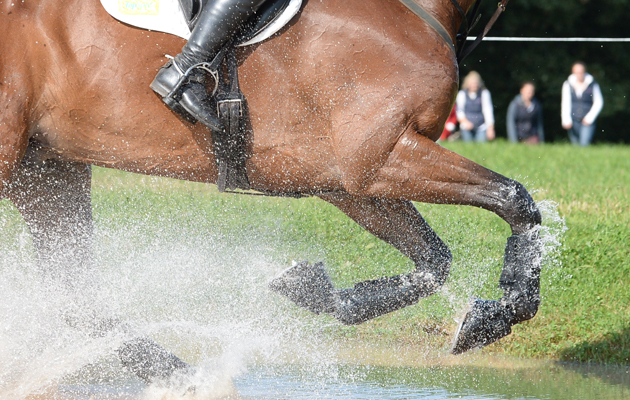An interesting case brought before the FEI Tribunal has once again given rise to concerns that the current blood rules are not “fit for purpose”. H&H finds out more...
New calls have been made for a review of the blood rules in showjumping over concerns they are not “fit for purpose”.
The topic is under the spotlight again after Irish Olympian Billy Twomey lost his appeal against the FEI’s decision to eliminate him when blood was found on the flank of Lady Lou at the boot and bandage control check after his grand prix-winning round in Wellington, Florida, on 15 March.
{"content":"PHA+VGhlIGdyb3VuZCBqdXJ5IGVsaW1pbmF0ZWQgQmlsbHkgZm9yIHZldGVyaW5hcnkgcmVhc29ucywgbmFtZWx5IGJsb29kwqBvbiB0aGUgbWFyZeKAmXMgbGVmdCBmbGFuayBvd2luZ8KgdG8gdGhlIHVzZSBvZiBzcHVycy48L3A+CjxwPkF0IGFuIEZFSSBUcmlidW5hbCBoZWFyaW5nIEJpbGx5IHNhaWQgdGhlcmUgd2FzIG5vIGJsb29kIGFmdGVyIHRoZXkgY29tcGxldGVkIHRoZWlyIGp1bXAtb2ZmLCBwcm92aWRpbmcgYSBzdGlsbCBmcm9tIGEgdmlkZW8gYXMgZXZpZGVuY2UsIGFuZCBzYWlkIGhlIGJlbGlldmVkIHRoZSBibG9vZCB3YXMgdGhlIHJlc3VsdCBvZiB0aGUgbWFyZeKAmXMgYnVtcGluZyBoZXJzZWxmIG9uIGxlYXZpbmcgdGhlIGFyZW5hLiBIZSBkaXNhZ3JlZWQgaGUgd2FzIGVsaW1pbmF0ZWQgZm9yIHZldGVyaW5hcnkgcmVhc29ucywgYXMgdGhlcmUgd2FzIG5vIGluZGljYXRpb24gdGhlIGRlY2lzaW9uIHdhcyBhIHZldGVyaW5hcnkgbWF0dGVyLCBhbmQgdGhlwqBGRUnCoG9mZmljaWFsc+KAmSByZXBvcnQgZGlkIG5vdCBtZW50aW9uIHZldGVyaW5hcnkgcmVhc29ucywgb3IgaWRlbnRpZnkgYW55IGludGVyYWN0aW9uIHdpdGggYSB2ZXQuPC9wPgo8cD5UaGUgRkVJIHNhaWQgdGhlIGdyb3VuZCBqdXJ5IHdhcyBjbGVhciB0aGF0IGFzIHRoZSBlbGltaW5hdGlvbiB3YXMgZm9yIHZldGVyaW5hcnkgcmVhc29ucywgdGhlcmUgd2FzIG5vIHBvc3NpYmlsaXR5IG9mIHByb3Rlc3Qgb3IgYXBwZWFsLiBVbmRlciBGRUkgcnVsZXMsIGZpZWxkLW9mLXBsYXkgZ3JvdW5kIGp1cnkgZGVjaXNpb25zLCB3aGljaCBhcmUgZmluYWwsIGluY2x1ZGUgZGVjaXNpb25zIG9uIGVsaW1pbmF0aW9uIG9yIGRpc3F1YWxpZmljYXRpb24gZm9yIHZldGVyaW5hcnkgcmVhc29ucy48L3A+CjxwPjxkaXYgY2xhc3M9ImFkLWNvbnRhaW5lciBhZC1jb250YWluZXItLW1vYmlsZSI+PGRpdiBpZD0icG9zdC1pbmxpbmUtMiIgY2xhc3M9ImlwYy1hZHZlcnQiPjwvZGl2PjwvZGl2PjxzZWN0aW9uIGlkPSJlbWJlZF9jb2RlLTMxIiBjbGFzcz0iaGlkZGVuLW1kIGhpZGRlbi1sZyBzLWNvbnRhaW5lciBzdGlja3ktYW5jaG9yIGhpZGUtd2lkZ2V0LXRpdGxlIHdpZGdldF9lbWJlZF9jb2RlIHByZW1pdW1faW5saW5lXzIiPjxzZWN0aW9uIGNsYXNzPSJzLWNvbnRhaW5lciBsaXN0aW5nLS1zaW5nbGUgbGlzdGluZy0tc2luZ2xlLXNoYXJldGhyb3VnaCBpbWFnZS1hc3BlY3QtbGFuZHNjYXBlIGRlZmF1bHQgc2hhcmV0aHJvdWdoLWFkIHNoYXJldGhyb3VnaC1hZC1oaWRkZW4iPg0KICA8ZGl2IGNsYXNzPSJzLWNvbnRhaW5lcl9faW5uZXIiPg0KICAgIDx1bD4NCiAgICAgIDxsaSBpZD0ibmF0aXZlLWNvbnRlbnQtbW9iaWxlIiBjbGFzcz0ibGlzdGluZy1pdGVtIj4NCiAgICAgIDwvbGk+DQogICAgPC91bD4NCiAgPC9kaXY+DQo8L3NlY3Rpb24+PC9zZWN0aW9uPjwvcD4KPHA+QmlsbHnCoGJlbGlldmVkIHRoZcKgRkVJwqBibG9vZCBwcm90b2NvbCB3YXMgbm90IGZvbGxvd2VkOyBoZSBzYWlkIHdoZW4gaGUgd2FzIHRvbGQgYmxvb2QgY291bGQgYmUgc2Vlbiwgbm8gcGljdHVyZXMgd2VyZSB0YWtlbiBhdCB0aGUgdGltZS4gSGUgaGFkIGJlZW4gYWxsb3dlZCB0byB3YWxrIHRoZSBtYXJlIG9mZiBhbmQgMjAgdG8gMzAgbWludXRlcyBhZnRlciBoaXMgcm91bmQsIHRoZSBnbG92ZSB0ZXN0IHdhcyBjb25kdWN0ZWQuIEl0IHdhcyBhIGhvdCBkYXksIGFuZCBhIHZldCBjb25maXJtZWQgdGhlIGdsb3ZlcyBjb3VsZCBoYXZlIGluZHVjZWQgdGhlIGJsZWVkaW5nLiBUaGUgRkVJwqBzYWlkIEJpbGx5wqBjb3VsZCBoYXZlIGxvZGdlZCBhIHByb3Rlc3Qgd2l0aGluIDMwIG1pbnV0ZXMgb2YgYmVpbmcgbm90aWZpZWQgYnV0IGRpZCBub3QuIFRoZcKgRkVJIGFkZGVkIGl0IGlzIHJpZGVyc+KAmSByZXNwb25zaWJpbGl0eSB0byBrbm93IHRoZSBydWxlcy48L3A+CjxwPlRoZSBGRUkganVtcGluZyBzdGV3YXJkcyBtYW51YWwgc3RhdGVzIHRoYXQgYSBzdGV3YXJkIG11c3QgaW5mb3JtIHRoZSBhdGhsZXRlIGlmIHRoZXJlIGlzIGFuIGlzc3VlIHdpdGggYmxvb2Qgb24gdGhlIGhvcnNl4oCZcyBmbGFuaywgdGFrZSBhIHBob3RvIG9mIHRoZSBhZmZlY3RlZCBhcmVhIGFuZCBvZiB0aGUgc3B1cnMsIGFuZCBpbmZvcm0gdGhlIGNoaWVmIHN0ZXdhcmQuIFRoZSBjaGllZiBzdGV3YXJkIHdpbGwgY29uZHVjdCBhIGdsb3ZlIHRlc3QsIGFuZCBpbmZvcm0gdGhlIGdyb3VuZCBqdXJ5LiBVbmRlciBGRUkgdmV0ZXJpbmFyeSBydWxlcywgc3Rld2FyZHMgYW5kIG9mZmljaWFsIHZldHMgaGF2ZSB0aGUgYXV0aG9yaXR5IHRvIGV4YW1pbmUgaG9yc2VzLCBzbyB0aGUgZGVjaXNpb24gdG8gZWxpbWluYXRlIGZvciB2ZXRlcmluYXJ5IHJlYXNvbnMgZG9lcyBub3QgcmVxdWlyZSB0aGUg4oCcZXhjbHVzaXZlIGludm9sdmVtZW504oCdIG9mIGEgdmV0LjwvcD4KPHA+VGhlIFRyaWJ1bmFswqBydWxlZCB0aGF0IGFzIHRoZSBhcHBlYWzCoHdhc8KgYWdhaW5zdCB0aGUgZ3JvdW5kIGp1cnkgZGVjaXNpb24gaW4gcmVsYXRpb24gdG8gZWxpbWluYXRpb24gZm9yIHZldGVyaW5hcnkgcmVhc29ucywgdGhlIGFwcGVhbCB3YXMgbm90IGFkbWlzc2libGUuPC9wPgo8ZGl2IGNsYXNzPSJhZC1jb250YWluZXIgYWQtY29udGFpbmVyLS1tb2JpbGUiPjxkaXYgaWQ9InBvc3QtaW5saW5lLTMiIGNsYXNzPSJpcGMtYWR2ZXJ0Ij48L2Rpdj48L2Rpdj4KPHA+QmlsbHkgdG9sZCA8ZW0+SCZhbXA7SDwvZW0+IGFwcGVhbGluZyB3YXMgaW1wb3J0YW50IHRvIGhpbSBhcyBpbiBoaXMgdmlldywgdGhlIGJsb29kIHJ1bGVzIG5lZWQg4oCcZnVydGhlciB0aG91Z2h04oCdIGFuZCBjaGFuZ2VzIHRvIGZvcm0gYW5kIGltcGxlbWVudGF0aW9uLCBpZiB0aGV5IGFyZSB0byBzZXJ2ZSB0aGVpciBpbnRlbmRlZCBmdW5jdGlvbi48L3A+CjxwPuKAnEkgZG8gbm90IGRvdWJ0IHRoZSBjb3JyZWN0bmVzcyBvZiB0aGUgcHJpbmNpcGxlIGJlaGluZCB0aGUgcnVsZXMsIHdoZXJlIHRoZSB3ZWxmYXJlIG9mIGhvcnNlcyBpbiBvdXIgc3BvcnQgaXMgbWluZSBhbmQgbXkgZmVsbG93IHJpZGVyc+KAmSBhbmQgb3duZXJz4oCZIGZvcmVtb3N0IGNvbnNpZGVyYXRpb24uIEJ1dCBJIHF1ZXN0aW9uIHRoZSB1dGlsaXR5IG9mIHRoZSBydWxlIGluIGl0cyBjdXJyZW50IGZvcm0gYW5kIHRoZSBtYW5uZXIgaW4gd2hpY2ggaXQgaXMgaW1wbGVtZW50ZWQs4oCdIGhlIHNhaWQuPC9wPgo8ZGl2IGNsYXNzPSJhZC1jb250YWluZXIgYWQtY29udGFpbmVyLS1tb2JpbGUiPjxkaXYgaWQ9InBvc3QtaW5saW5lLTQiIGNsYXNzPSJpcGMtYWR2ZXJ0Ij48L2Rpdj48L2Rpdj4KPHA+QmlsbHkgYWRkZWQg4oCcaW5ldml0YWJseeKAnSB0aGVyZSB3b3VsZCBiZSBvY2Nhc2lvbnMgb2YgbWFya3MgY2F1c2VkIGJ5IHNwdXJzIGluIGp1bXBpbmcuPC9wPgo8cD7igJxXZSBhcmUganVtcGluZyAxLjYwbSB0cmFja3MgYW5kIG1hbmFnaW5nIG91ciBvd24gd2VpZ2h0IGFuZCB0aGUgbW92ZW1lbnQgb2YgdGhlIGhvcnNlLiBJbiB0aGUgY2FzZSBvZiBMYWR5IExvdSwgdGhlIG1hcmsgb24gaGVyIGZsYW5rIHdhcyBhIHN1cGVyZmljaWFsIGdyYXplIG5vIGJpZ2dlciB0aGFuIGEgZmluZ2VybmFpbCwgYW5kIGl0IG9jY3VycmVkIGFmdGVyIG15IHJvdW5kIHdoZW4gSSB3YXMgbGVhdmluZyB0aGUgcmluZy4gVGhlIEZFSSBkaWQgbm90IGNvbmR1Y3QgYW55IHZldGVyaW5hcnkgZXhhbWluYXRpb24gYW5kIExhZHkgTG91IHdhcyBhbHdheXMgaW4gZmluZSBoZWFsdGgs4oCdIGhlIHNhaWQuPC9wPgo8ZGl2IGNsYXNzPSJhZC1jb250YWluZXIgYWQtY29udGFpbmVyLS1tb2JpbGUiPjxkaXYgaWQ9InBvc3QtaW5saW5lLTUiIGNsYXNzPSJpcGMtYWR2ZXJ0Ij48L2Rpdj48L2Rpdj4KPHA+4oCcVW5sZXNzIHNwdXJzIGFyZSB0byBiZSBvdXRsYXdlZCwgdGhlIG91dGNvbWUgb2YgdGhlaXIgdXNlIGhhcyB0byBiZSBhZGRyZXNzZWQgaW4gYSBtb3JlIGNvbnNpZGVyZWQgbWFubmVyLiBNeSBqdW1wLW9mZiB3YXMgcGVyaGFwcyA0MCBzZWNvbmRzIGluIGR1cmF0aW9uLiBUaGUgRkVJIGV4YW1pbmVkIExhZHkgTG91IGJlZm9yZSBJIHN0YXJ0ZWQgYm90aCByb3VuZHMuIFRoZXJlIHdhcyBubyBxdWVzdGlvbiByYWlzZWQgYWJvdXQgd2hldGhlciBzaGUgd2FzIGZpdCB0byBzdGFydC4gTm8gb25lIHN1Z2dlc3RlZCBhbnkgbW9kaWZpY2F0aW9ucyB0byBteSB0YWNrIG9yIHNwdXJzLiBObyBvbmUgY29uc2lkZXJlZCBJIHJvZGUgaW5hcHByb3ByaWF0ZWx5LjwvcD4KPHA+4oCcSWYgcmlkZXJzIGFuZCBvd25lcnMgYXJlIHRvIGxvc2UgY29tcGV0aXRpb25zIGluIHdoaWNoIHRoZXkgd2VyZSBwZXJtaXR0ZWQgdG8gc3RhcnQsIHN1cmVseSBhIG1vcmUgY29uc2lkZXJlZCBhcHByb2FjaCBpcyByZXF1aXJlZCBmb3IgdGhlIHJlZ3VsYXRpb25zIHRvIGJlIGZpdCBmb3IgcHVycG9zZS7igJ08L3A+CjxwPkFuIEZFSSBzcG9rZXNtYW4gdG9sZCA8ZW0+SCZhbXA7SDwvZW0+IHRoZSBGRUkgaGFzIGEgZHV0eSwgd2hpY2ggaXQg4oCcZG9lcyBub3QgdGFrZSBsaWdodGx54oCdLCB0byBlc3RhYmxpc2ggYXBwcm9wcmlhdGUgcnVsZXMgYW5kIGd1aWRlbGluZXMgdG8gZW5zdXJlIGhvcnNlIHdlbGZhcmUuIEhlIHNhaWQgcnVsZXMgcmVsYXRpbmcgdG8gYmxvb2QgYXJlIGRpc2NpcGxpbmUtc3BlY2lmaWMsIGFkZGluZyBhbWVuZG1lbnRzIHRvIHJ1bGVzIHRvIOKAnGVuaGFuY2UgaGFybW9uaXNhdGlvbuKAnSBhY3Jvc3MgZGlzY2lwbGluZXPCoHdlcmUgdm90ZWQgdGhyb3VnaCB0aGUgMjAxNyBGRUkgZ2VuZXJhbCBhc3NlbWJseS48L3A+CjxwPlByaW9yIHRvIDIwMTgsIGJsb29kIGZvdW5kIG9uIGEgaG9yc2UgaW4ganVtcGluZyByZXN1bHRlZCBpbiBkaXNxdWFsaWZpY2F0aW9uLsKgVW5kZXLCoHRoZSBhbWVuZGVkIHJ1bGVzwqBzaW5jZcKgSmFudWFyeSAyMDE4LCB0aGVyZSBhcmUgdHdvIHNlcGFyYXRlIHByb3Zpc2lvbnMuIElmIGJsb29kIGlzIGZvdW5kIG9uIGEgZmxhbmsgaXQgbWVhbnMgZWxpbWluYXRpb24sIGJ1dCBpZiBtYXJrcyBpbmRpY2F0ZSBleGNlc3NpdmUgdXNlIG9mIHNwdXJzIChvciB3aGlwKSB0aGUgY29tYmluYXRpb24gd2lsbCBiZSBkaXNxdWFsaWZpZWQuPC9wPgo8cD7igJxUaGUgcnVsZXMgYW5kIHByb3RvY29scyBhcmUgY29udGludW91c2x5IGFzc2Vzc2VkIGFuZCwgd2hlcmUgbmVjZXNzYXJ5LCB1cGRhdGVkIHRvIGVuc3VyZSBvdXIgcnVsZXMgb24gdGFjayBhcmUgZml0IGZvciBwdXJwb3NlLCBhbmQgbmV3IHJlc2VhcmNoIGlzIGZhY3RvcmVkIGludG8gdGhhdCzigJ0gc2FpZCB0aGUgc3Bva2VzbWFuLjwvcD4KPGgzPkFwcHJvcHJpYXRlIHNhbmN0aW9uczwvaDM+CjxwPkEgc3Bva2VzbWFuIGZvciB0aGUgSW50ZXJuYXRpb25hbCBKdW1waW5nIFJpZGVycyBDbHViIChJSlJDKSwgd2hpY2ggcmFpc2VkIGNvbmNlcm5zIGFib3V0IHRoZSBibG9vZCBydWxlcyBpbiAyMDE3IGFuZCBjYWxsZWQgZm9yIG9mZmljaWFscyB0byBiZSBhYmxlIHRvIHVzZSBkaXNjcmV0aW9uIHdoZW4gZGVhbGluZyB3aXRoIGNhc2VzIChuZXdzLCAxNiBGZWJydWFyeSAyMDE3KSwgdG9sZCA8ZW0+SCZhbXA7SDwvZW0+IHRoZSBJSlJDIGJlbGlldmVzIGJsb29kIGNhc2VzIG11c3QgYmUgc2FuY3Rpb25lZCBidXQgdGhlcmUgc2hvdWxkIGJlIGRpZmZlcmVudCBraW5kcyBvZiBzYW5jdGlvbnMgZm9yIHdoZXRoZXIgaXQgd2FzIGFuIGFjY2lkZW50YWwgb3IgbWlub3Igb3IgbWFqb3IgdmlvbGF0aW9uLjwvcD4KPHA+4oCcQ3VycmVudGx5IHRoaXMgaXMgbm90IHRha2VuIGludG8gYWNjb3VudCwgbGVhZGluZyB0byBzYW5jdGlvbnMgd2hpY2ggYXJlIG5vdCBwcm9wb3J0aW9uYXRlIHRvIHRoZSB2aW9sYXRpb24s4oCdIGhlIHNhaWQuIOKAnFdpdGhvdXQgd2lzaGluZyB0byBlbnRlciBpbnRvIHRoZSBtZXJpdHMgb2bCoEJpbGx5wqBUd29tZXnigJlzIGNhc2UsIHdlIG11c3QgcmVpdGVyYXRlIHRoYXQgdGhlIG5vcm0gaXMgZmxhd2VkIGFuZCBzaG91bGQgYmUgcmV2aWV3ZWQgaW4gb3JkZXIgdG8gYmV0dGVyIHJlc3BlY3TCoHRoZSBwcmluY2lwbGUgb2YgcmlnaHRzIHJlY29nbmlzZWQsIGFtb25nIG90aGVycywgYnkgdGhlIENvdXJ0IG9mIEFyYml0cmF0aW9uIGZvciBTcG9ydCBbQ0FTXS4gVGhlc2UgaW5jbHVkZcKgdGhlIHByb3BvcnRpb25hbGl0eSBvZiBzYW5jdGlvbnMsIHZvbHVudGFyeSBvciBpbnZvbHVudGFyeSBpbmZyYWN0aW9ucyBsZWFkaW5nIHRvIGFnZ3JhdmF0aW5nIG9yIG1pdGlnYXRpbmcgY2lyY3Vtc3RhbmNlcywgYW5kIHdoZXRoZXIgb3Igbm90IGl0IHdhcyBhIGZpcnN0IG9mZmVuY2UsIGFzIHdlbGwgdGhlIG5lZWQgdG8gcHJvdmlkZSBhbiBhY2N1cmF0ZSBjb25zaWRlcmF0aW9uIG9mIHRoZSBpbXBsaWVkIGNvbnNlcXVlbmNlcyDigJMganVzdCBhcyBpbiBhbiBvcmRpbmFyeSBjb3VydHJvb20uPC9wPgo8ZGl2IGNsYXNzPSJpbmplY3Rpb24iPjwvZGl2Pgo8cD7igJxOb3QgY29uc2lkZXJpbmcgdGhlc2UgcHJpbmNpcGxlcyBpbiBzcG9ydGluZyBsYXcgY3JlYXRlcyBzZW50ZW5jZXPCoHRoYXTCoGFyZSBzb21ldGltZXMgcmVnYXJkZWQgYnkgYXRobGV0ZXMsIG1hbmFnZXJzIGFuZCB0aGUgcHVibGljIGFzIHRoZSByZXN1bHQgb2YgYSBzcG9ydGluZyBpbmp1c3RpY2Uu4oCdPC9wPgo8cD5CaWxsecKgaGFkIDIxIGRheXMgZnJvbSB0aGUgVHJpYnVuYWzigJlzIGRlY2lzaW9uIG9uIDE4IEp1bmUgdG8gYXBwZWFsIHRoZSBkZWNpc2lvbiB0byBDQVMuIEEgQ0FTIHNwb2tlc21hbiB0b2xkIDxlbT5IJmFtcDtIPC9lbT4gaXQgaGFkIG5vdCByZWNlaXZlZCBhbiBhcHBlYWwuPC9wPgo8cD4K"}
You may also be interested in…
The rider has said he is ‘thankful the horse is absolutely fine’ and fully supports the decision
Scott Brash on Hello Forever
Global Champions League co-founder Jan Tops said the rider is ‘great with his horses and didn’t deserve that at all’
Credit: Trevor Meeks/LIHS
There's elimination and a yellow card for one under-25 rider at Liverpool International show. He was also stripped of his
Anna Ross is calling for rules regarding blood in the mouth to be revisited, but the FEI is standing firm
Credit: Peter Nixon
The eventing committee is considering proposals to ‘provide clarity’ for all involved in the sport
Stay in touch with all the news in the run-up to and throughout the major shows and events during 2025 and beyond with a Horse & Hound subscription. Subscribe today for all you need to know ahead of these major events, plus online reports on the action as it happens from our expert team of reporters and in-depth analysis in our special commemorative magazines. Have a subscription already? Set up your unlimited website access now
H&H senior news writer
Since joining H&H in 2018, Becky has covered a broad range of equestrian news including welfare matters, veterinary studies, FEI Tribunal hearings and road safety campaigns. She has also interviewed top riders including Scott Brash, John Whitaker and Ian Stark, to name just a few. Becky’s reporting has taken her to Canada for Spruce Meadows and France for Pau five-star, as well as the Royal Highland and Blair Castle International Horse Trials closer to home. She was also a key part of the remote reporting team for the Tokyo Olympics and the Europeans.






